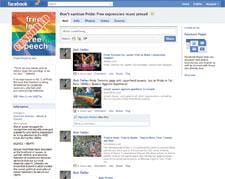
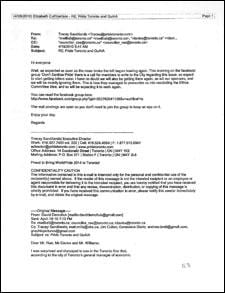
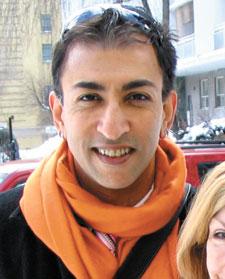
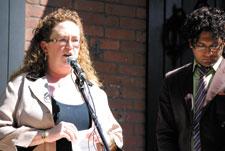
Pride Toronto executive director Tracey Sandilands, with board member Mark Singh, announces a ban on "Israeli apartheid" on May 25. Credit: Matt Mills
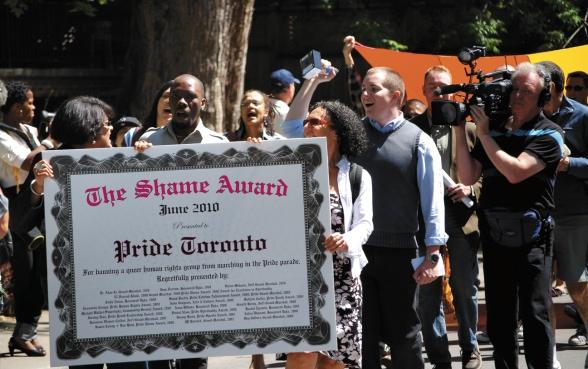
Credit: Brent Creelman photo
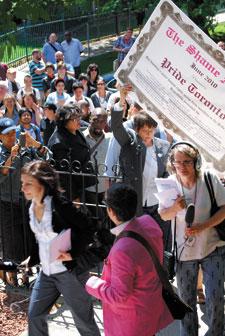
Credit: Matt Mills
>> The following is a timeline of events that appeared in the June 17 issue of Xtra‘s Toronto paper. Click here to read every story Xtra has published on the issue.
May 23, 2009
After being named 2009 Pride Toronto (PT) grand marshal, Toronto lawyer, activist and Salaam: Queer Muslim Community founder El-Farouk Khaki introduces speakers at a Queers Against Israeli Apartheid (QuAIA) event at Buddies in Bad Times Theatre.
May 28, 2009
After Frank Dimant, executive VP of B’nai Brith Canada, calls for PT to take disciplinary action against Khaki for contravening Pride’s anti-discrimination policy, National Post runs a story on the kerfuffle under the headlines “Anti-Zionists banned from Pride Parade,” and “Protests prohibited.” In it, then-new PT executive director Tracey Sandilands says Khaki promised PT that he will “never under any circumstances speak on the Israeli issue from a Pride point of view…. We will be very much more careful this year,” she says. “We will make sure that we have a presence to ensure that people don’t slip into the parade.”
June 28, 2009
QuAIA, Khaki and scores of other politicians and political groups march in the parade without incident.
November 17, 2009
Martin Gladstone, Avi Benlolo, Carol Pasternak and Daniel Engel meet with city staffers. A briefing note to Ward 27 city councillor Kyle Rae reads, “Gladstone stated that Pride has no mandate to engage in anti-Israel advocacy and that by allowing marchers, some of who wore swastikas and carried signs that read ‘End Israeli Apartheid’ and ‘We Stand with Queers in Palestine,’ is contrary to the City of Toronto Anti-Racism, Access & Equity Policy.”
January 2010
PT conducts a series of focus groups to, it says, “help shape Pride Toronto’s strategy for community involvement and communications from now through to WorldPride in 2014.” Third-party emails circulate urging opponents of QuAIA and Totally Naked Toronto Men to apply for the focus groups in an effort to persuade PT to alienate those groups. In a January 21 letter to Sandilands, Avi Benlolo of the Friends of Simon Wiesenthal Center for Holocaust Studies writes “to express my shock and concern that Pride Toronto has chosen to follow the route of focus groups to determine if Israel- and Jew-bashing is an acceptable practice.” Benlolo threatens to pressure sponsors and funders if PT doesn’t alienate QuAIA.
February 9, 2010
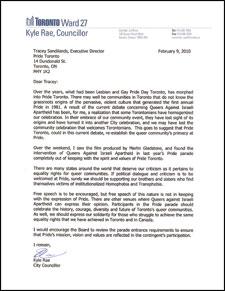 In a letter to Sandilands, Rae writes, “Over the weekend, I saw the film produced by Martin Gladstone and found the intervention of Queers Against Israeli Apartheid in last year’s parade completely out of keeping with the spirit and values of Pride Toronto.”
In a letter to Sandilands, Rae writes, “Over the weekend, I saw the film produced by Martin Gladstone and found the intervention of Queers Against Israeli Apartheid in last year’s parade completely out of keeping with the spirit and values of Pride Toronto.”
February 11, 2010
PT announces changes to the grand marshal selection process. Final selections will be made by a jury of peers, instead of a public voting process. “We are revisiting a number of our processes to see how we can better advance our mission and vision,” says Sandilands.
March 2, 2010
In an email to Rae, Gladstone writes, “If Pride permits [QuAIA] to march under the guise of free speech it will be IMPOSSIBLE to get charitable status, and it places Pride at odds with all who are now distancing themselves from what the Ontario legislature correctly labelled as odious, hateful and a monologue to promote intolerance and violence.”
He thanks Rae for taking a leadership role.
March 10, 2010
PT issues a press release about terms and conditions for participation in the parade. It reads in part, “Participating groups must agree to… have their messages and signage approved by the ethics committee of Pride Toronto in advance of the event. Groups who fail to cooperate with the new practices will be denied permission to take part or removed from the lineup if necessary.”
March 11, 2010
 The Don’t Sanitize Pride: Free Expression Must Prevail Facebook group is launched. More than 1,500 people join over the next two weeks.
The Don’t Sanitize Pride: Free Expression Must Prevail Facebook group is launched. More than 1,500 people join over the next two weeks.
March 15, 2010
Xtra receives copies of two emails. The first, dated March 10, from the Friends of the Simon Wiesenthal Center to Sandilands, offers to help promote Pride in return for a “clearer statement on Pride’s position on QuAIA.” The second, from conservative PR firm Navigator, advises PT to hold steady in spite of the backlash. It reads in part, “Pride’s decisions were not made based on any particular group or term, and we will not prejudge applications. Period.”
March 16, 2010
Sandilands tells Xtra that Pride staffers were aware there was a move afoot to influence the January focus groups, and that PT moved to keep those people out.
March 17, 2010
Cathy Gulkin tells Xtra that she participated in a Jan 26 Pride focus group that was “clearly stacked.”
March 23, 2010
PT announces it will drop its policy of vetting signs in advance of the parade. However, a detailed messaging policy remains on the books, meaning offensive signs could still be turfed on the day of the parade.
March 31, 2010
In a letter to then-Pride co-chairs Jim Cullen and Genevieve D’Iorio, Toronto city manager Joseph Pennachetti writes, “Concerns have been brought to the city’s attention that participants (ie Queers Against Israeli Apartheid) in the 2009 Pride parade have engaged in activities that are not in keeping with the intent of city policies respecting grant-funded events. Including the obligation to provide a welcoming environment.”
April 13, 2010
City of Toronto officials meet with Cullen, D’Iorio and Sandilands. “While the ethics committee is not being implemented, the parade committee will vet all applications,” reads a city briefing note. PT agrees to determine whether it will ban QuAIA as a group or simply censor the messaging, “Israeli apartheid,” from the parade. PT vows “very strong volunteers will be assigned to two or three ‘problem’ groups.” The note is cc’d to Ward 27 councillor Kyle Rae.
April 19, 2010
 “Well as expected as soon as the news broke the left began howling again,” writes Sandilands in an email to Rae and city staffers. “I have no doubt that we will also be getting [complaints again], as will our sponsors, and we will mostly be ignoring them. This is how they managed to pressurize us into rescinding the ethics committee idea, and so will be expecting it to work again.”
“Well as expected as soon as the news broke the left began howling again,” writes Sandilands in an email to Rae and city staffers. “I have no doubt that we will also be getting [complaints again], as will our sponsors, and we will mostly be ignoring them. This is how they managed to pressurize us into rescinding the ethics committee idea, and so will be expecting it to work again.”
May 25, 2010
PT holds a press conference to announce a ban on the term “Israeli apartheid” from any messaging in the parade. PT co-chair Jim Cullen resigns in the face of the controversy, but D’Iorio tells the crowd the “organization is in a state of operational crisis.” Pride won’t happen, she says, unless PT censors the term “Israeli apartheid.” The PT board resolution on the move enumerates all manner of funding and support PT says could be lost if the organization fails to censor the term. Word of the move leaks out in advance, and more than 100 protesters turn out, chanting “Whose Pride? Our Pride!” and “Resign! Resign! Resign!” Queer activists are separated from PT directors and staff by a fence and police guard.
“They’re not going to take away the funding,” says playwright Brad Fraser, on behalf of the freshly minted Pride Coalition for Free Speech. “There’s this pervasive fear being built up that bad things are going to happen if you let QuAIA march, but they would be insane to cut funding to the largest festival in Toronto!”
May 28, 2010
Dr Alan Li rejects his 2010 Pride grand marshal accolade. “Pride’s recent decision to ban the term ‘Israeli apartheid’ and thus prohibit the participation of the group Queers Against Israeli Apartheid from participating in Pride celebrations this year is a slap in the face to our history of diverse voices,” he writes. In the following days, Jane Farrow rejects the 2010 honoured dyke accolade and Michelle Walker declines the community service award.
June 7, 2010
As the sun rises, the 2010 international grand marshals, Gloria Careaga and Renato Sabbadini, announce they won’t be attending Toronto Pride. “The decision to resign was motivated by the ban on the expression ‘Israeli apartheid’ by the board of directors of the Toronto Pride,” they write.
At 10am, more than 20 additional former honoured dykes, grand marshals and award recipients hold a press conference at the 519 Church Street Community Centre to renounce their accolades. Dozens march with them, the Refuseniks, from The 519 to the offices of Pride Toronto to return their statuettes and to deliver an award of shame, but the building is locked tight.
At 6:30pm, hundreds of queer people gather back at The 519 for a community meeting on the matter. Sandilands attends Rae’s retirement party, which is under way simultaneously a few blocks south.
Former honoured dykes, grand marshals and award recipients (“The Refuseniks”):
James Loney (“Fearless” Theme Award, 2006)
Zahra Dhanani (Honoured Dyke, 2006)
Sky Gilbert (Grand Marshal, 2000)
Faith Nolan (Honoured Dyke, 2009)
El-Farouk Khaki (Grand Marshal, 2009)
Rachel Epstein (Honoured Dyke, 2007)
Gareth Henry (International Grand Marshal, 2008)
Anna Willats (Honoured Dyke, 2008)
JP Hornick (Grand Marshal, 2002)
John Greyson (Arts & Culture Award, 2009)
Savoy Howe (Award for Excellence in Sports, 2008)
Leonardo Zuniga (Human Rights Award, 2009)
Matthew Cutler (Youth Award, 2009)
Michelle Walker (Community Service Award, 2010)
Jane Farrow (Honoured Dyke, 2010)
Gloria Careaga and Renato Sabbadini (International Grand Marshals, 2010)
Faisal Alam (Spirituality Award, 2009)
Victor Mukasa (International Grand Marshal, 2009)
Salah Bachir (Grand Marshal, 2005)
Rosanna Flamer-Caldera (International Grand Marshal, 2007)
Alan Li (Grand Marshal, 2010)

 Why you can trust Xtra
Why you can trust Xtra


